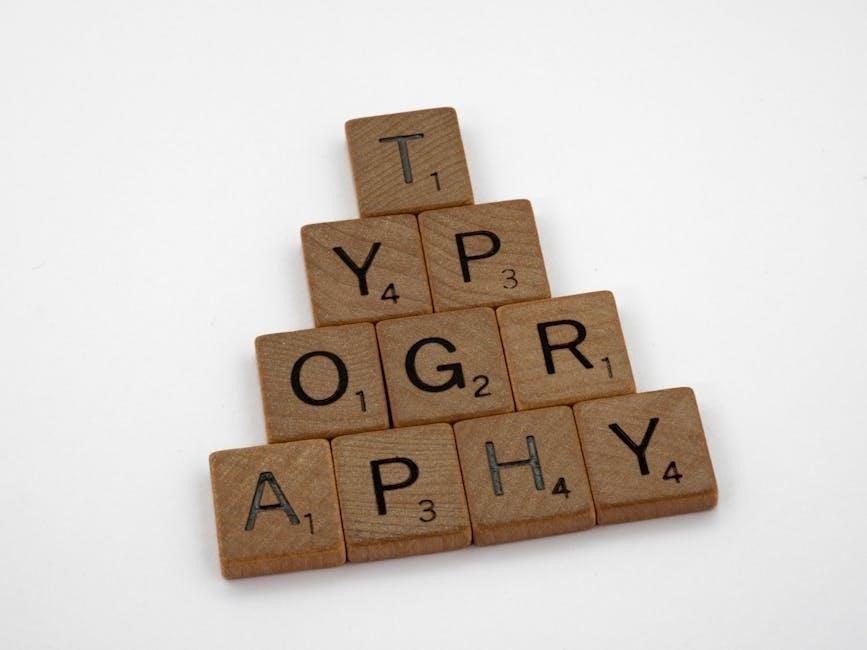NACLO is a prestigious annual competition focusing on linguistic puzzles, offering students engaging challenges that combine logic, language analysis, and problem-solving skills in a fun, educational environment.
1.1 What is NACLO?
NACLO, or the North American Computational Linguistics Olympiad, is an annual competition designed for high school and older middle school students. It focuses on solving linguistic puzzles that challenge participants to apply their analytical and problem-solving skills; The puzzles often involve computational linguistics, language patterns, and logical reasoning. NACLO is unique because it combines fun and education, making it an engaging way for students to explore the fascinating world of languages. The competition is supported by various academic institutions and organizations, offering students a platform to showcase their talents. Participants can prepare using resources like linguistic puzzle PDFs, which provide practice materials and insights into the types of challenges they may face. NACLO also offers an online practice system, allowing students to hone their skills and familiarize themselves with the competition format. This event is an excellent gateway for students interested in computational linguistics and cognitive science.
1.2 The Role of Linguistic Puzzles in NACLO
Linguistic puzzles are the cornerstone of NACLO, serving as the primary tool for assessing participants’ skills in computational linguistics and analytical thinking. These puzzles are designed to challenge students to recognize patterns, decode languages, and solve complex linguistic problems. They often involve analyzing phonological, syntactic, or semantic structures, making them both intellectually stimulating and fun. The puzzles are language-independent, meaning they can be solved without prior knowledge of the specific language used, ensuring accessibility for a diverse range of participants. By engaging with these puzzles, students develop critical thinking, problem-solving, and cognitive skills that are essential for advanced studies in linguistics and cognitive science. NACLO’s puzzles also encourage creativity and logical reasoning, making them a unique and rewarding experience for participants.
Understanding Linguistic Puzzles
Linguistic puzzles are engaging, logic-based challenges that test skills in language analysis, pattern recognition, and problem-solving. They often involve decoding, syntax, and semantics, making them both educational and fun.
2.1 Definition and Examples of Linguistic Puzzles
Linguistic puzzles are challenges that require analyzing and understanding language structures, often involving pattern recognition, decoding, and problem-solving. They may focus on phonetics, syntax, morphology, or semantics. Examples include identifying sound patterns in words, decoding texts in unfamiliar languages, or solving anagrams. These puzzles often draw on multiple languages, showcasing linguistic diversity. For instance, a puzzle might ask participants to recognize grammatical rules in a language they’ve never studied or to reconstruct a sentence from fragmented parts. Such exercises enhance cognitive skills like analytical thinking and attention to detail, while also fostering an appreciation for the complexity of human language. Many puzzles are designed to be both educational and entertaining, making them ideal for learners and enthusiasts alike.
2.2 Types of Linguistic Puzzles in NACLO
NACLO features a variety of linguistic puzzles that test participants’ understanding of language structures and computational linguistics. These puzzles often involve phonetics, morphology, syntax, and semantics. Examples include identifying sound patterns, decoding texts in unfamiliar languages, and solving anagrams. Some puzzles focus on reconstructing grammatical rules or translating historical texts, while others involve logical deductions based on linguistic data; Additionally, NACLO puzzles may incorporate computational elements, such as recognizing patterns in language corpora or applying algorithms to solve language-based problems. The puzzles are designed to challenge participants’ analytical and problem-solving skills while fostering an appreciation for linguistic diversity. Many puzzles are language-independent, making them accessible to a wide range of learners.

Educational Value of Linguistic Puzzles
Linguistic puzzles enhance cognitive development by improving pattern recognition, analytical thinking, and problem-solving skills, preparing learners for competitions like NACLO and fostering a deeper understanding of language structures.
3.1 Cognitive Development Through Puzzle Solving
Solving linguistic puzzles fosters significant cognitive development by enhancing critical thinking, memory, and problem-solving abilities. These puzzles challenge participants to identify patterns, decode languages, and apply logical reasoning, which strengthens neural pathways associated with analytical thinking. Engaging with such exercises regularly improves mental agility and the ability to approach complex problems systematically. The process of dissecting and understanding linguistic structures also boosts memory retention and attention to detail. Furthermore, the incremental difficulty of puzzles encourages perseverance and adaptability, key traits for academic and real-world challenges. By engaging with linguistic puzzles, individuals develop a sharper mind and a more structured approach to learning, making these activities invaluable for intellectual growth and preparation for competitions like NACLO.
3.2 Preparation for Linguistic Competitions
Linguistic puzzle PDFs are invaluable tools for preparing students for competitions like NACLO. These resources simulate real competition puzzles, offering a wide range of challenges that test phonetics, syntax, semantics, and problem-solving skills. By working through these exercises, participants develop a deeper understanding of linguistic structures and improve their ability to analyze complex language patterns. The puzzles also enhance critical thinking and time management, essential for performing well under competition pressure; Many PDFs include solutions or explanations, allowing learners to review their mistakes and refine their strategies. Regular practice with these materials helps build confidence and familiarity with the types of problems encountered in NACLO, making them an indispensable part of a competitor’s preparation regimen.

Resources and Study Materials
NACLO offers diverse resources, including PDFs with linguistic puzzles, practice problems, and study guides. These materials help students enhance their skills and prepare effectively for competitions.
4.1 Linguistic Puzzle PDFs as Learning Tools
Linguistic puzzle PDFs serve as valuable learning tools for NACLO preparation. These documents contain a variety of exercises that challenge students to analyze patterns, decode languages, and solve complex problems. Many PDFs are designed to mimic actual competition puzzles, allowing participants to practice under timed conditions. They often include answers and explanations, enabling self-assessment and improvement. Additionally, some PDFs focus on specific linguistic concepts, such as phonetics or syntax, providing in-depth practice for weaker areas. The portability of PDFs makes them ideal for studying on-the-go, ensuring consistent practice. Overall, these resources are essential for developing the critical thinking and analytical skills required for success in NACLO and similar linguistic competitions.
4.2 Effective Study Tips for Using PDF Resources
To maximize the benefits of linguistic puzzle PDFs, adopt a structured study approach. Begin by setting aside dedicated time for practice, simulating exam conditions to enhance focus. Start with easier puzzles to build confidence before tackling more challenging ones. Use a timer to replicate the time constraints of actual competitions. Solve puzzles without notes or external aids to sharpen your problem-solving skills. After attempting a puzzle, thoroughly review the provided answers and explanations to understand your mistakes. Focus on patterns and recurring concepts across puzzles to improve your analytical abilities. Regularly revisit difficult puzzles to track your progress. By consistently applying these strategies, you can effectively utilize PDF resources to enhance your performance in NACLO and other linguistic competitions.

NACLO Competition Structure
NACLO is a three-hour competition featuring eight linguistic puzzles labeled A to H. Participants solve problems individually, applying analytical and computational linguistics skills to succeed in this challenging event.
5.1 Overview of the Annual Competition
The North American Computational Linguistics Olympiad (NACLO) is an annual competition designed for high school and older middle school students; It showcases a variety of linguistic puzzles that challenge participants to apply their analytical and computational linguistics skills. The competition is typically three hours long and consists of eight problems, labeled A to H, which vary in difficulty. These puzzles are carefully crafted to be both intellectually stimulating and enjoyable, as noted by puzzle enthusiasts like Will Shortz. The event not only tests students’ understanding of language structures but also encourages creative thinking and problem-solving abilities. Many participants use linguistic puzzle PDFs and online resources to prepare for the competition, which has become a cornerstone for fostering interest in linguistics among young scholars.
5.2 Rules and Duration of the Contest
The North American Computational Linguistics Olympiad (NACLO) contest is a three-hour competition where participants solve eight linguistic puzzles labeled A to H. The problems are designed to vary in difficulty, with easier puzzles marked as “green circle” and more challenging ones progressing in complexity. Students are allowed to use approved resources, such as linguistic puzzle PDFs, to aid their problem-solving process. The contest is open to high school and older middle school students, fostering a competitive yet educational environment. Participants are expected to work independently, showcasing their analytical and computational linguistics skills. The event emphasizes both intellectual challenge and enjoyment, as highlighted by puzzle enthusiasts like Will Shortz, who describes the puzzles as “surprisingly fun.” This structure ensures the contest is engaging while maintaining its academic rigor.

Cognitive and Problem-Solving Skills
Solving linguistic puzzles enhances cognitive abilities like pattern recognition and analytical thinking, fostering problem-solving skills through engaging, intellectually stimulating challenges in NACLO competitions and educational resources.
6.1 Pattern Recognition in Linguistic Puzzles
Pattern recognition is a cornerstone of solving linguistic puzzles in NACLO, as it enables participants to identify structures, rules, and relationships within languages. By analyzing sounds, syntax, and semantics, students develop the ability to spot recurring patterns, such as phonological rules or morphological structures. These skills are crucial for deciphering unfamiliar languages and solving complex puzzles. The process of recognizing patterns enhances cognitive flexibility and logical reasoning, allowing participants to approach problems from multiple angles. Furthermore, pattern recognition fosters a deeper understanding of linguistic diversity and universality, making it an invaluable skill for both competition and academic pursuits. NACLO puzzles often incorporate diverse languages, challenging participants to apply their pattern recognition abilities creatively and effectively.
6.2 Developing Analytical Thinking
NACLO puzzles are designed to cultivate strong analytical thinking skills, essential for tackling complex linguistic challenges. Participants learn to break down problems, identify underlying rules, and apply logical reasoning to arrive at solutions. These puzzles often involve decoding unfamiliar languages, analyzing syntactic structures, or recognizing phonetic patterns, which sharpen critical thinking abilities. By engaging with diverse linguistic data, students develop the capacity to approach problems systematically and creatively. Analytical thinking is not only vital for success in NACLO but also transferable to other academic and real-world scenarios. The process of solving these puzzles fosters a mindset that values precision, curiosity, and intellectual rigor, preparing participants for advanced studies in linguistics, computer science, and related fields.

NACLO Online Practice System
NACLO offers an interactive online platform with past problems and automated scoring, allowing participants to practice and refine their linguistic puzzle-solving skills effectively and independently.
7.1 Features of the Online Practice Platform
The NACLO Online Practice System is an interactive platform designed to enhance learning through engaging features. It includes access to past competition problems, allowing users to familiarize themselves with various linguistic puzzles. The system offers automated scoring, providing immediate feedback on submissions. Additionally, it features a user-friendly interface that enables participants to track their progress and identify areas for improvement. The platform also includes detailed explanations for each problem, helping users understand the solutions and refine their skills. Furthermore, it supports a wide range of devices, ensuring accessibility from anywhere. These features collectively create a comprehensive and effective environment for practicing and mastering linguistic puzzles, making it an invaluable resource for NACLO preparation.
7.2 Benefits of Automated Scoring
The automated scoring system in the NACLO Online Practice Platform offers numerous benefits for participants. It provides immediate feedback on submissions, allowing users to quickly identify correct and incorrect answers. This feature enables learners to track their progress effectively and understand their strengths and weaknesses. The system ensures consistency and accuracy in grading, eliminating human error. Additionally, automated scoring allows for instant access to detailed explanations for each problem, fostering a deeper understanding of linguistic concepts. The ability to review results and explanations at any time enhances the learning experience, making it more engaging and efficient. Overall, the automated scoring system streamlines the practice process, helping participants refine their problem-solving skills and build confidence for the actual competition.

Notable Participants and Teams
Prominent participants, like Preston Lust and Max Popken, have excelled in NACLO, showcasing exceptional linguistic puzzle-solving skills. Their success highlights the competition’s ability to nurture talent and foster collaboration.
8.1 Success Stories from Past Competitions
Over the years, NACLO has produced exceptional competitors who excelled in solving complex linguistic puzzles. Participants like Preston Lust and Max Popken have showcased remarkable problem-solving skills, earning top scores in national competitions. Their achievements highlight the competition’s role in nurturing linguistic talent. Many past winners have gone on to pursue advanced studies in linguistics and computational science, demonstrating how NACLO serves as a launching pad for academic and professional success. The Staples Linguistics Club, led by these accomplished individuals, exemplifies teamwork and dedication, proving that collaborative efforts can lead to outstanding results. These success stories inspire future participants, proving that linguistic puzzles are not just fun but also a pathway to intellectual growth and recognition.
8.2 Prominent Linguistics Clubs in NACLO
Prominent linguistics clubs play a vital role in fostering talent for NACLO. Clubs like the Staples Linguistics Club, led by dedicated students, have excelled in solving linguistic puzzles, showcasing their analytical and problem-solving skills. These clubs often collaborate with universities and organizations, providing members with resources like linguistic puzzle PDFs to enhance their preparation. SFU and William & Mary are notable institutions that host NACLO, offering students a platform to engage in competitive linguistic challenges. These clubs not only nurture linguistic expertise but also encourage teamwork and intellectual growth, contributing significantly to the success of participants in NACLO competitions. Their achievements highlight the importance of collaborative learning and the impact of dedicated mentorship in linguistic puzzle-solving.

Universal Appeal of Linguistic Puzzles
Linguistic puzzles are universally appealing due to their accessibility, fun nature, and intellectual stimulation. Their language-independent design makes them suitable for diverse learners worldwide.
9.1 Language-Independent Nature of Puzzles
Linguistic puzzles in NACLO are designed to be language-independent, meaning they don’t rely on prior knowledge of specific languages. This makes them accessible to a diverse range of learners, regardless of their linguistic background. The puzzles often focus on universal principles of language structure, such as phonetics, syntax, and semantics, which are applicable across languages. This approach ensures that participants from different cultural and educational backgrounds can engage equally. Additionally, the use of PDF resources and online platforms like the NACLO Online Practice System further democratizes access, allowing anyone with an interest in linguistics to participate and learn. This inclusivity is a key factor in the widespread appeal of NACLO and its puzzles.
9.2 Accessibility for Diverse Learners
Linguistic puzzles in NACLO are designed to be accessible to a wide range of learners, ensuring inclusivity and diversity. The language-independent nature of the puzzles, as highlighted in linguistic puzzle PDFs, allows participants from various linguistic and cultural backgrounds to engage without prior language-specific knowledge. This makes the competition and study materials accessible to students with different learning styles and abilities. Additionally, the availability of resources like PDFs and the NACLO Online Practice System provides learners with flexible ways to study and practice. These tools cater to visual, auditory, and kinesthetic learners, offering a comprehensive approach to problem-solving. The structured exercises and interactive platforms ensure that all participants can benefit, regardless of their individual learning preferences or challenges.
Variety of Topics in NACLO Puzzles
NACLO puzzles explore a wide range of topics, from historical and modern languages to interdisciplinary connections, ensuring diverse and engaging challenges for participants.
10.1 Historical and Modern Language Diversity
NACLO puzzles encompass a broad spectrum of languages, ranging from ancient civilizations to modern dialects, offering insights into linguistic evolution and cultural diversity. Participants engage with historical languages like Latin, Ancient Greek, and Old English, as well as modern languages from diverse families such as Indo-European, Sino-Tibetan, and Afro-Asiatic. These puzzles often highlight unique phonological, syntactic, and semantic features, encouraging deep exploration of linguistic structures. By incorporating both historical and contemporary languages, NACLO fosters an appreciation for the richness of global communication while challenging participants to apply analytical skills to diverse linguistic systems.
10.2 Interdisciplinary Connections in Puzzles
NACLO puzzles often bridge linguistics with other disciplines, such as computer science, mathematics, and anthropology, creating a unique interdisciplinary challenge. Many puzzles require participants to apply computational thinking, logical reasoning, and problem-solving strategies akin to those used in coding or algorithm design. For instance, tasks involving pattern recognition in phonological systems or syntactic structures may overlap with concepts in data analysis or artificial intelligence. Additionally, some puzzles incorporate elements of cryptography, blending linguistic analysis with mathematical problem-solving. This interdisciplinary approach not only enhances the complexity of the puzzles but also demonstrates the broader applicability of linguistic knowledge in diverse fields. By engaging with these challenges, participants gain a deeper understanding of how linguistics intersects with other areas of study.





